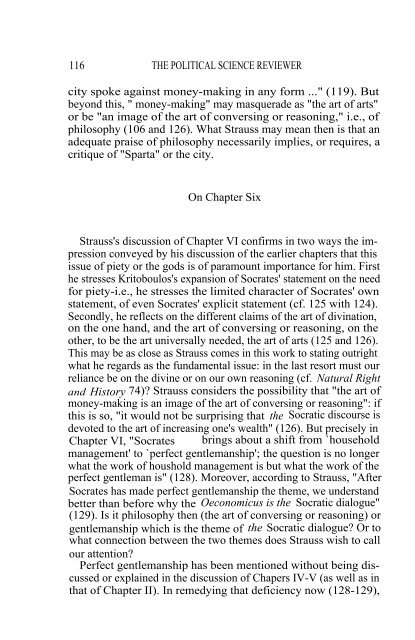Strauss on Xenophon's Socrates Xenophon's Socratic Discourse: An ...
Strauss on Xenophon's Socrates Xenophon's Socratic Discourse: An ...
Strauss on Xenophon's Socrates Xenophon's Socratic Discourse: An ...
Create successful ePaper yourself
Turn your PDF publications into a flip-book with our unique Google optimized e-Paper software.
116 THE POLITICAL SCIENCE REVIEWER<br />
city spoke against m<strong>on</strong>ey-making in any form ..." (119). But<br />
bey<strong>on</strong>d this, " m<strong>on</strong>ey-making" may masquerade as "the art of arts"<br />
or be "an image of the art of c<strong>on</strong>versing or reas<strong>on</strong>ing," i.e., of<br />
philosophy (106 and 126). What <str<strong>on</strong>g>Strauss</str<strong>on</strong>g> may mean then is that an<br />
adequate praise of philosophy necessarily implies, or requires, a<br />
critique of "Sparta" or the city.<br />
On Chapter Six<br />
<str<strong>on</strong>g>Strauss</str<strong>on</strong>g>'s discussi<strong>on</strong> of Chapter VI c<strong>on</strong>firms in two ways the impressi<strong>on</strong><br />
c<strong>on</strong>veyed by his discussi<strong>on</strong> of the earlier chapters that this<br />
issue of piety or the gods is of paramount importance for him. First<br />
he stresses Kritoboulos's expansi<strong>on</strong> of <strong>Socrates</strong>' statement <strong>on</strong> the need<br />
for piety-i.e., he stresses the limited character of <strong>Socrates</strong>' own<br />
statement, of even <strong>Socrates</strong>' explicit statement (cf. 125 with 124).<br />
Sec<strong>on</strong>dly, he reflects <strong>on</strong> the different claims of the art of divinati<strong>on</strong>,<br />
<strong>on</strong> the <strong>on</strong>e hand, and the art of c<strong>on</strong>versing or reas<strong>on</strong>ing, <strong>on</strong> the<br />
other, to be the art universally needed, the art of arts (125 and 126).<br />
This may be as close as <str<strong>on</strong>g>Strauss</str<strong>on</strong>g> comes in this work to stating outright<br />
what he regards as the fundamental issue: in the last resort must our<br />
reliance be <strong>on</strong> the divine or <strong>on</strong> our own reas<strong>on</strong>ing (cf. Natural Right<br />
and History 74)? <str<strong>on</strong>g>Strauss</str<strong>on</strong>g> c<strong>on</strong>siders the possibility that "the art of<br />
m<strong>on</strong>ey-making is an image of the art of c<strong>on</strong>versing or reas<strong>on</strong>ing": if<br />
this is so, "it would not be surprising that the <strong>Socratic</strong> discourse is<br />
devoted to the art of increasing <strong>on</strong>e's wealth" (126). But precisely in<br />
Chapter VI, "<strong>Socrates</strong> brings about a shift from `household<br />
management' to `perfect gentlemanship'; the questi<strong>on</strong> is no l<strong>on</strong>ger<br />
what the work of houshold management is but what the work of the<br />
perfect gentleman is" (128). Moreover, according to <str<strong>on</strong>g>Strauss</str<strong>on</strong>g>, "After<br />
<strong>Socrates</strong> has made perfect gentlemanship the theme, we understand<br />
better than before why the Oec<strong>on</strong>omicus is the <strong>Socratic</strong> dialogue"<br />
(129). Is it philosophy then (the art of c<strong>on</strong>versing or reas<strong>on</strong>ing) or<br />
gentlemanship which is the theme of the <strong>Socratic</strong> dialogue? Or to<br />
what c<strong>on</strong>necti<strong>on</strong> between the two themes does <str<strong>on</strong>g>Strauss</str<strong>on</strong>g> wish to call<br />
our attenti<strong>on</strong>?<br />
Perfect gentlemanship has been menti<strong>on</strong>ed without being discussed<br />
or explained in the discussi<strong>on</strong> of Chapers IV-V (as well as in<br />
that of Chapter II). In remedying that deficiency now (128-129),

















